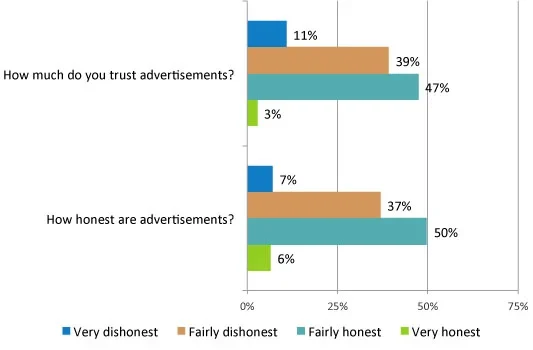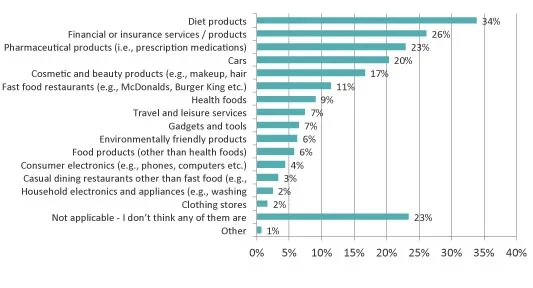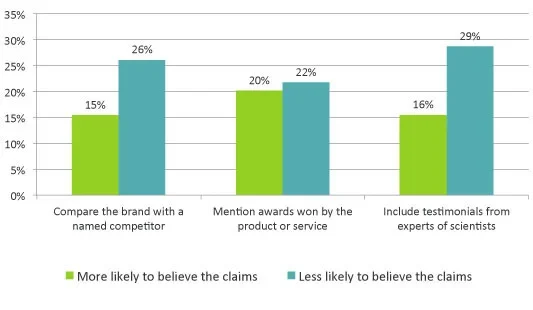Half of Americans (50%) who are aware of advertising don’t trust what they see, read and hear in advertisements. 44% think that advertisements are dishonest. A clear majority (58%) thinks that there should be stronger requirements for proving claims in advertising.
Trust in advertising is very much dependent on education. 65% of post grads think advertising cannot be trusted compared to 44% of those with a high school education. 35-54 year olds (58%) are more likely to trust advertising than 18-34 year olds and 55+ (48% of both groups think advertising can be trusted).
How much do you trust the advertisements that you see, read and hear?

Advertising from the restaurants, clothing stores and consumer electronics categories are the most trusted with diet products, financial services, pharmaceutical and cars the least trusted.
A quarter of Americans are inclined to believe that the advertising claims for casual dining restaurants (e.g. Applebees, Chili’s, Olive Garden), realistically reflect the features and capabilities of the restaurants. Fast food advertising is less well trusted, with only 16% believing their adverts accurately represent the restaurant chains but still higher than many other categories
Women (23%) are more likely than men (16%) to believe that clothing store advertising offers an accurate description of the features of the stores, whereas men (17%) are more inclined than women (12%) to feel consumer electronics advertising delivers a fair representation of product features.
Advertising campaigns for diet products are considered least trustworthy by one third (34%) of Americans, followed by financial services products, which are distrusted by just over one quarter (26%). Men are particularly suspicious of financial services ads with 31% of men compared to 22% of women dubious of claims made. Despite, or maybe because of the mile-a-minute pharmaceutical disclaimers, prescription medication didn’t fare well, and their ads are distrusted by 23%.
Which advertisements do you feel are the LEAST trustworthy?
By this we mean which are least likely to reflect the true features and capabilities of the product being sold.

Although 20% believe that auto adverts are not to be trusted, 16% say they buy the cars despite not trusting the ad.
Many of the common advertising tactics like comparative advertising, scientific endorsements and awards claims may be counter productive and put consumers on alert. Although 16% think they are more likely to believe an advertising claim, which includes the testimonial of a scientist or expert, that expert makes 29% less likely to believe in an ad. Ads making comparisons with brand competitors are more likely to be believed by 15% but less likely to be believed by 26%.
How much do you trust the advertisements that you see, read and hear?

Americans are unsure which bodies monitor truth in advertising in the US. 46% think it is the realm of the Federal Trade Commission (FTC), 17% think that is managed by class action lawsuits and individual claims, and 14% think it is the realm of the self-regulating body of American advertisers the ASRC.
For further information about poll results, and for details about methodology and omnibus services, please email omnibus.us@yougov.com.
Find the full results here.
Image courtesy of Getty










